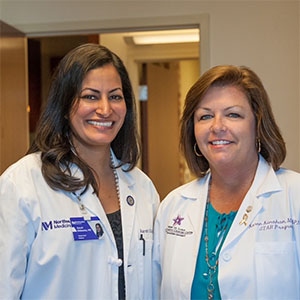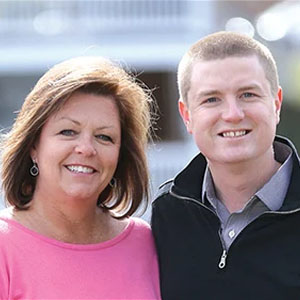Celebrating 20 Years of Impact in Survivorship Care
 For childhood cancer survivors, learning to protect their health and embrace survivorship is a lifelong job. 20 years ago, the STAR Program (Survivors Taking Action & Responsibility), a clinical, research and education program for adult survivors of childhood cancer at the Lurie Cancer Center, was one of the first in the nation to take this innovative approach to long-term care, and serves as a model for other institutions seeking to meet the needs of the growing population of childhood cancer survivors.
For childhood cancer survivors, learning to protect their health and embrace survivorship is a lifelong job. 20 years ago, the STAR Program (Survivors Taking Action & Responsibility), a clinical, research and education program for adult survivors of childhood cancer at the Lurie Cancer Center, was one of the first in the nation to take this innovative approach to long-term care, and serves as a model for other institutions seeking to meet the needs of the growing population of childhood cancer survivors.
Since 2001, the program has provided research-based state-of-the-art survivorship care for patients who were diagnosed before age 21, addressing the medical, psychological and social challenges that can occur months, or even years after treatment ends. Part of Lurie Cancer Center’s Cancer Survivorship Institute, the STAR Program is led by Aarati Didwania, MD, a physician with decades of experience in cancer survivorship, and Karen Kinahan, DNP, APN, FNP-BC, a nurse practitioner with expertise in the late effects of childhood cancer.
“Cancer patients should know that they will always need medical attention, but many times it is not because there is something wrong. It’s because we are trying to prevent something from going wrong,” says Didwania, a professor of Medicine and Medical Education at Feinberg.
Today, thanks to medical advances, more than 80 percent of childhood cancer patients in the U.S. become cancer survivors. The goal of the STAR Program is not “disease surveillance,” says Kinahan. “We believe that education empowers our patients to manage potential late effects and advocate for their own long-term health.”
 Childhood cancer survivor, Andy Seibert, began treatment for rhabdomyosarcoma at Ann & Robert H. Lurie Children’s Hospital of Chicago, formerly Children’s Memorial Hospital, when he was just 15 months old. “During the three years of my treatment and the countless follow-up visits over the past 28 years, one person in particular has been a constant force of love, support and reassurance for my family,” he recalls.
Childhood cancer survivor, Andy Seibert, began treatment for rhabdomyosarcoma at Ann & Robert H. Lurie Children’s Hospital of Chicago, formerly Children’s Memorial Hospital, when he was just 15 months old. “During the three years of my treatment and the countless follow-up visits over the past 28 years, one person in particular has been a constant force of love, support and reassurance for my family,” he recalls.
Karen Kinahan was Andy’s nurse during and after his cancer treatment, until she moved to pilot the STAR Program at the Lurie Cancer Center. When Andy transitioned his care as a young adult, Kinahan was there to help him navigate his long-term follow-up care. “Today, I continue to live a full, happy and healthy life,” he says. “I have a beautiful wife and a rambunctious puppy, a house my wife and I built and a job that I love.”
“At the same time, I know that the long-term impact of my treatment will not be without its challenges, and I am comforted knowing that Karen will continue to be there for me.”
Read Andy’s essay, “A Lifetime of Impact for Patients with Cancer,” in CURE Magazine
